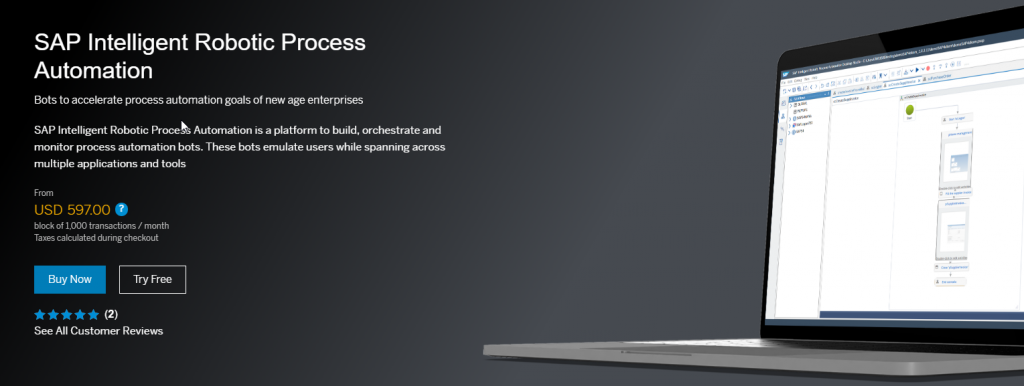SAP acquired and rebranded Contextor RPA as SAP Intelligent RPA or SAP IRPA. Contextor was probably not the easiest to use RPA. SAP though likes to make the most of it, along with AI technologies.
SAP IRPA is focused on the automation of SAP-native processes. So, it is meant to provide better integration into the SAP application stack. You can combine with other tools like UiPath or Automation Anywhere if you like to automate across non-SAP applications.
SAP RPA bots generally use UI automation (Contextor), API, and AI-ML. It has three key components.
SAP IRPA Key Components
SAP RPA is a cloud solution that works with the two on-premise components Desktop Agent and Desktop Studio.
Desktop Studio: This is where you develop the Automation by describing your workflow using a set of scripts.
Desktop Agent: This the local component on the desktop that executes the Automation. It requires a connection to Cloud Factory to execute.
Cloud Factory: It is a central repository for your bots, hosted on SAP Cloud Platform. The control center manages all common resources of the Intelligent RPA.

The SAP bots are consumed mostly using pre-built automations from their “RPA store”.
Ready to use Intelligent RPA bots
SAP has been creating “ready to use” bots for various ERP modules and is available on the SAP Intelligent RPA store. From a presentation I attended, SAP has plans to automate about 50% of the ERP workload with RPA. At that time (April 2020), they had about 56 ready-made Bots available in the SAP intelligent RPA store.
SAP has since added many more bots to the store. Their bots are still catching on though – they have their distinct benefits and limitations
SAP IRPA – Benefits and limitations
Intelligent RPA provides deep integration into your organization’s existing SAP applications. So, if you are already familiar with SAP, developing automation is easier and quicker.
You get prebuilt S/4 HANA bots that are available in the RPA store that we discussed above. This again makes the creation of your bots easier.
SAP uses AI-ML widely which makes the bots smart, embedding intelligence into SAP workflows. The added intelligence helps make auto-corrections etc. and generally makes the SAP ERP smarter.
Being SAP focused is also a limitation. You can overcome the limitation by using other tools.
SAP has been building some good documentation around IRPA. Here is a bunch of resources from their blog.
SAP IRPA or Opensap IRPA help
Here is a list of assets and enablement opportunities on SAP Intelligent Robotic Process Automation.
- SAP RPA web page: sap.com/rpa
- SAP Help Portal: help.sap.com/IRPA
- Store: store.sap.com
- SAP Community Page: community.sap.com/intelligent-rpa
- SAP Cloud Platform: sap.com/cloud-platform/capabilities/ibpm.intelligent-rpa
- Series of blog posts: digitalistmag.com/tag/intelligent-rpa-series
- YouTube: youtube.com/SAPintelligentRPA
- openSAP:
- SAP Intelligent Robotic Process Automation in a Nutshell (available in self-paced mode)
- How to build Bots with SAP Intelligent RPA (available in self-paced mode, re-run live starting March 31st)
- Business Process Automation in SAP S/4HANA with SAP Intelligent RPA
- What’s New with Bot Building in SAP Intelligent RPA (starting May 12th)
If you like to try out the product, here are your current free options:
- Get started with the Free Trial.
- Get your license from SAP Store.
SAP RPA Pricing
Your company can request an SAP Cloud Platform enterprise trial via their SAP account team, and you can use the cloud credits for SAP Intelligent RPA. It is a trial tenant in your own SAP Cloud Platform account that is valid for 90 days.
If you like to continue, you can choose a 3-month subscription – the lowest-tier subscription is around 500 EUR/month. After the first three months, you can choose to renew for a long-term subscription if you’re happy with the outcome.

If you are a partner, you can also get a Test & Development license from SAP PartnerEdge Portal.
SAP IRPA – Looking ahead
The response to SAP RPA has not been the most enthusiastic. This is expected as the product is SAP focused and needs the existing users to buy this add-on.
While it remains to be seen, it looks like the best way SAP can leverage ERP and AI would be to improve the core SAP ERP itself. A smarter ERP could be where we are headed.
What do you think of SAP RPA? Have you tried it out? Please let me know in the comments below. 👇